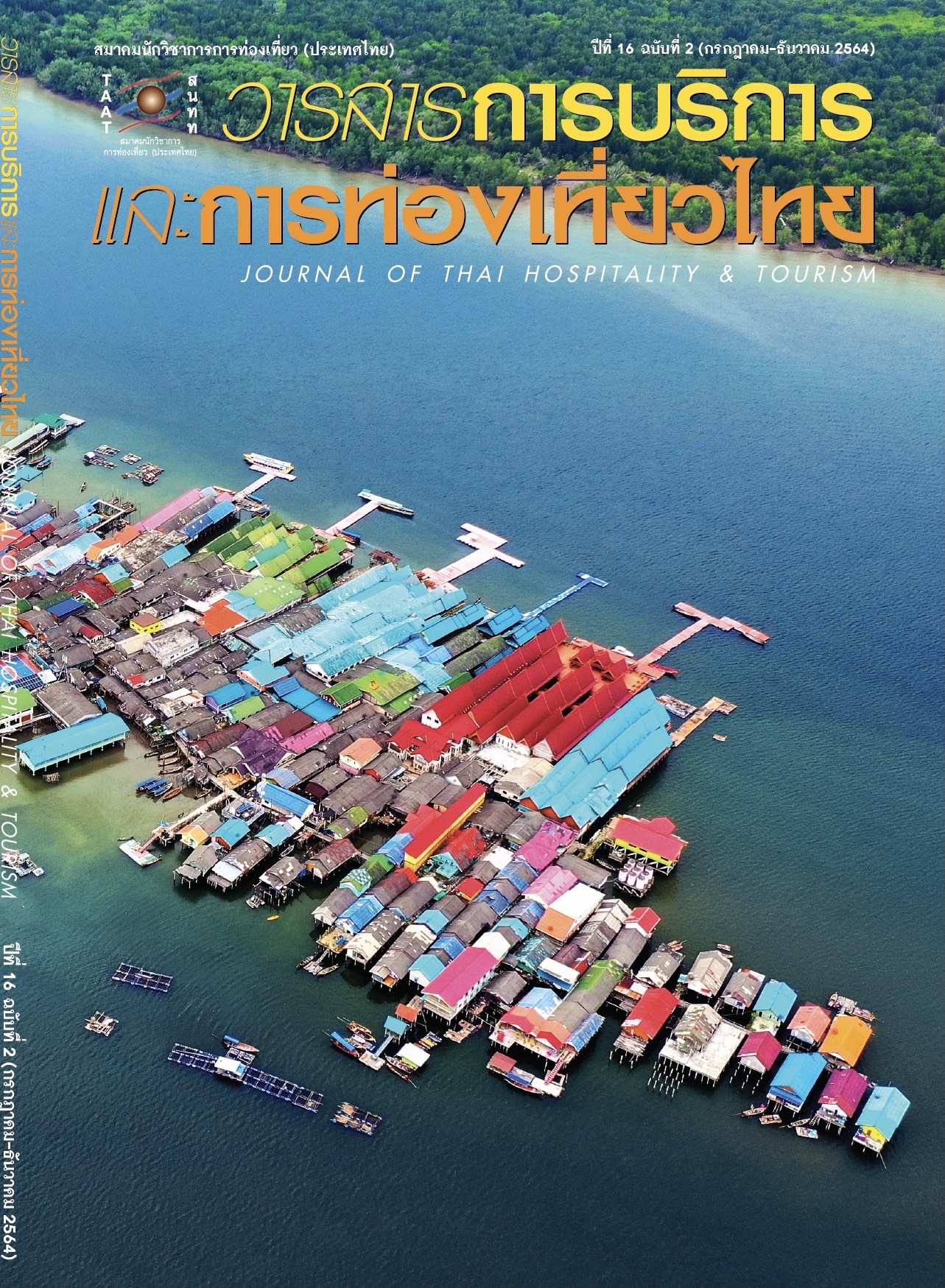ทำไมธุรกิจร้านอาหารไม่ประสบความสำเร็จและแนวทางการพัฒนาสู่ความเป็นเลิศ
Main Article Content
บทคัดย่อ
ปัจจุบันธุรกิจร้านอาหารของโลกและประเทศไทยมีการเติบโตและมีรูปแบบการให้บริการที่หลากหลายอยู่ตลอดเวลา การขยายตัวของการท่องเที่ยวเป็นปัจจัยสนับสนุนแต่ผู้ประกอบการธุรกิจร้านอาหารหลายรายที่เปิดดำเนินการแล้วไม่ประสบความสำเร็จเนื่องจากขาดความรู้ ความเข้าใจด้านการตลาด การบริหารจัดการ และการดำเนินงานอย่างเป็นระบบและกระบวนการ ส่งผลให้ธุรกิจร้านอาหารของไทยประมาณร้อยละ 60 ต้องปิดตัวลงภายในระยะเวลา 1 ปี และร้อยละ 80 สามารถอยู่รอดในตลาดได้แต่ก็ปิดตัวลงใน 3-5 ปี ดังนั้นบทความวิชาการนี้ได้นำเสนอสาเหตุที่ทำให้ธุรกิจร้านอาหารไม่ประสบความสำเร็จและนำเสนอโมเดลการพัฒนาธุรกิจร้านอาหารสู่ความเป็นเลิศ
ผลการศึกษาพบว่า หากผู้ประกอบการมุ่งหวังให้ธุรกิจร้านอาหารประสบความสำเร็จต้องมีการพัฒนาโดยยึดโมเดลคำว่า “RESTAURANT” ซึ่งประกอบด้วยการศึกษาค้นคว้า ความผูกพัน การออกแบบการบริการ การใช้เทคโนโลยี การบริหารจัดการ ผลิตภัณฑ์ที่มีเอกลักษณ์ การปรับปรุงพัฒนา การวางแผนงาน เครือข่ายความร่วมมือ และการทำงานร่วมกัน อีกทั้งรักษามาตรฐานของการทำธุรกิจร้านอาหารเพื่อพัฒนาสู่ความเป็นเลิศด้วย “5G” คือ อาหารดีมีคุณภาพ บริการโดดเด่น บรรยากาศเยี่ยม คุ้มค่าเงินและพร้อมแบ่งปัน
Article Details
เอกสารอ้างอิง
Angkulanon, R. (2018). Trendy 2-year Online Restaurant Worth Billions. Retrieved from https://www.thebangkokinsight.com/36421
Chaiyasain, C. (2016). Key Challenges and Success to Food and Beverage Cost Control in Hotel Industry. Journal of International and Thai Tourism, 12(1), 23–45.
Department of Business Development. (2017). Restaurant Business. Retrieved from https://www.dbd.go.th/download/document_file/Statisic/2560/T26/T26_201703.pdf
Gaztelumendi, I. (2015). Gastronomy: A Key Factor for the Development of Tourism. Paper Presented in the UNWTO Conference on Destination Management in the Mediterranean, Budva, Montenegro.
Global Wellness Institute. (2013). The Global Wellness Economy 2013 & 2014. Retrieved from https://globalwellnessinstitute.org/industry-research/global-wellness-tourism-economy-2013-2014/
Jindamanee, K. (2017). Found It! Most Likely at a Disrupt Restaurant. Bangkok: Taokaemai Enterprise.
Kasikorn Research Centre. (2018). The Market Value of Restaurant Business in 2018 is Expected to Grow 4–5% (Current Issue 2904). Retrieved from https://www.kasikornresearch.com/th/analysis/k-econ/business/Pages/36839.aspx
Marzullo, D. (2018). The Restaurant Statistics Owners Need to Know in 2018. Retrieved from https://upserve.com/restaurant-insider/25-restaurant-statistics-owners-know
Nation Restaurant Association. (2017). 2017 Restaurant Industry Pocket Factbook. Retrieved from https://kisales.com/wp-content/uploads/2017/06/Pocket_Factbook_FEB_2017-FINAL.pdf
Sampawthong, L. (2017). Poor Economy Expected 2,300 Restaurants Closed This Year. Retrieved from http://www.bangkokbiznews.com/news/detail/764406
Schlenther, R. (2018). F&B How to Simple/Effective/Practical. Faculty of Hospitality and Tourism, Prince of Songkla University, Phuket Campus.
Thamcharonkij, T. (2017). Business Model “Restaurant” in China. Retrieved from https://www.marketingoops.com/exclusive/insider-exclusive/o2o-food-business.
TMB Analysis. (2018). 5 Biggest Economic Trends Push 15 Businesses Grow in 2018. Retrieved from https://www.brandbuffet.in.th/2018/01/5-megatrends-drive-15-business-2018/
UNWTO. (2017). UNWTO Tourism Highlights 2017. Retrieved from https://www.e-unwto.org/doi/pdf/10.18111/9789284419029
Wongnai Team. (2018). Brief Information on Restaurant Business Trends 2018. Retrieved from https://www.wongnai.com/business-owners/thailand-restaurant-trend-2018


